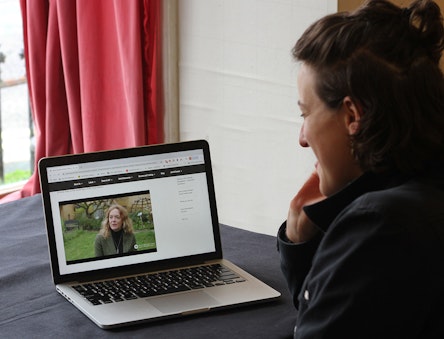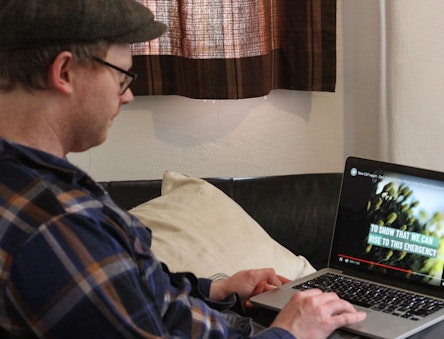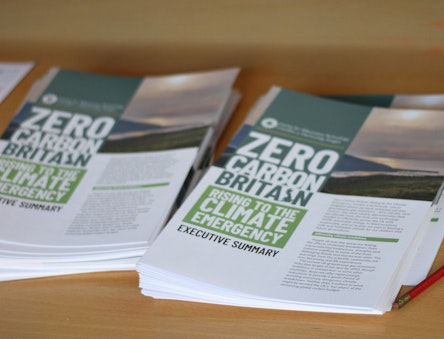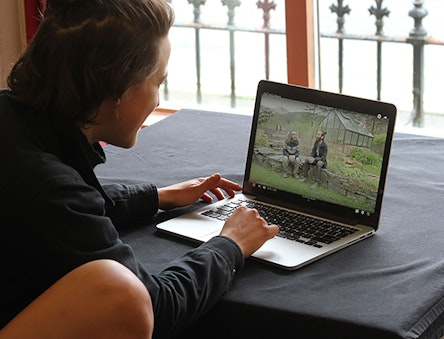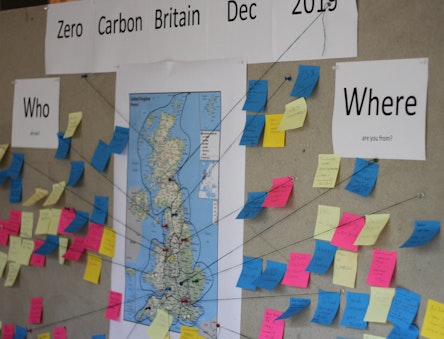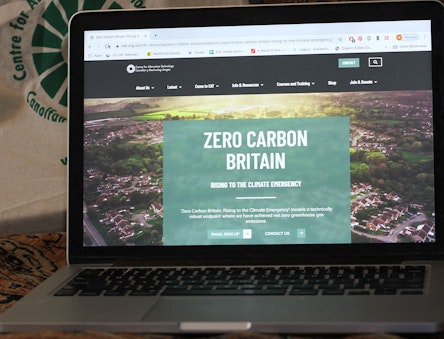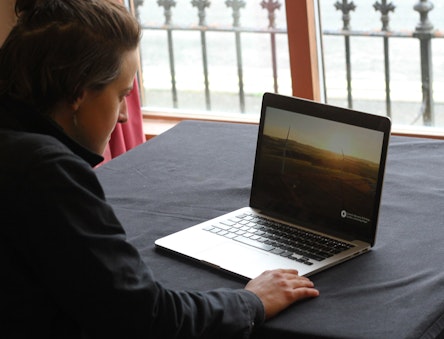
Zero Carbon Britain: Live Online – Scaling-up Community Action
March 06, 2025Home » Zero Carbon Britain: Live Online – Scaling-up Community Action
How can communities take the next steps on their road to a just transition and how do we kick-start the implementation of local Zero Carbon Britain plans?
CAT’s new Zero Carbon Britain course will explore how communities can best meet the challenge of the climate change and biodiversity crises in a time of political uncertainty – the science says we must, the technology says we can, time to say we will!
Drawing on our extensive experience working with communities, local authorities, and on our flagship in-house Zero Carbon Britain research and the expertise from our Graduate School of the Environment, the Zero Carbon Britain team invite you to join us for a day of interactive learning and discussions focusing on the key question: what next for your community?
Key Information
- Duration: Thurs 6th March 2025
- Location: online
- Start and finish times: 9:30am to 5pm (with timetabled break)
- Fees: £95 per person
- Includes: tuition, question and answer sessions, online course material
- Terms and conditions
- You must be 16 years or over to attend this course
- For a full list of terms and conditions click here
Please buy a full-price ticket if you are able to. Every penny helps create a safer, healthier and fairer future. However we don’t want anyone to miss out, so concessionary tickets are available if you cannot otherwise afford to join us.
Who is the course for
Topics and speakers have been chosen carefully to assist communities progress their activity and to optimise their collaboration with their Local Authorities, and is designed for community organisation members, Local Authority staff working with communities, and interested citizens.
What you will learn
During this one-day online course, participants will explore important topics related to the question of how communities can take the next-step on the road to a just transition using CAT’s own Zero Carbon Britain research, and hard-won experience of communities around the country. Topics include:
- The Big Picture: where are we now, and where might we be in 5-10 years’ time? This session is designed to bring participants up to speed on the latest ever-evolving climate & biodiversity science, and related efforts to respond at the international, national and local levels, including an assessment of the COP process.
- Climate Assemblies and Climate Juries are becoming valuable tools in rejuvenating democracy, guiding local action and bringing communities and local authorities together to focus on the challenge on climate change. In this session we are delighted to hear from Shared Future who have long experience in providing the expertise, support and training needed to host and run successful climate assemblies.
- Creating, implementing and developing a local vision or ‘local Zero Carbon Britain plan’ – does your community have a comprehensive plan to support a transition to a zero carbon Britain, involving renewables, energy demand reduction, land use change and wider behaviour change? In this session, participants will hear from community groups who have taken the national Zero Carbon Britain research as a model and applied it to their location, incorporating land and food, energy and retrofit solutions while maximising wider behaviour change.
- Forming or developing new, citizen-led groups that are able to manage infrastructure projects, services and land management is very hard, and the road to success is littered with abandoned projects, disbanded groups, and burnt-out community members. What have we to learn from the successes and failures, and how might communities best collaborate with Local Authorities? These sessions will share the recipe for success and introduce key concepts necessary to scale-up community empowerment in the transition to zero carbon communities.
- Next-steps – This session will draw together all the strands of the day’s training, allowing participants to formulate tangible next steps in their community’s journey to a just, regenerative, zero carbon society.
The live, interactive nature of this course will offer a rich online learning experience. To get the most out of the course, we suggest you:
- Download the Zero Carbon Britain; Rising to the climate emergency, and read (at least) the 8-page executive summary and explore chapters relevant to your areas of work / expertise.
- Make a note of key questions, reflections and ideas for going forwards.
Meet your tutors
Paul Allen
Paul is Knowledge and Outreach Coordinator for Zero Carbon Britain. He has been a member of the Wales Science Advisory Council (2010), board member of the International Forum for Sustainable Energy (2008) and a Climate Change Commissioner for Wales (2007). He holds an Honours degree in Electronic and Electrical Engineering and has been at CAT since 1988.
John Taylor
John joined Community Energy England in September 2024 as Head of Capacity Building. He will be leading CEE’s role within the Lottery funded Energy Learning Network, working with our members to create new training opportunities and career pathways, to design and share new delivery models, and to develop new partnerships across the industry, with the aim of helping the sector to maximise our scale and impact. He has worked for the past 16 years in local government advisory roles focusing on climate change action and community energy, including 6 years at the Greater South East Net Zero Hub where he oversaw the delivery of the Community Energy Fund.
Rachel Tuckett
Rachel is the Innovation Lab Manager at Zero Carbon Britain, and brings a decade of experience in the UK Civil Service, including in senior leadership, alongside a wealth of insights from roles in education, commercial enterprise and civil society. An experienced facilitator, Rachel is committed to helping organisations deliver a just transition and deepen their responses to the climate and nature emergencies. Rachel has held policy, strategy, operational and private secretary roles within the UK Civil Service. She spent five years at the Department for Environment, Food and Rural Affairs (Defra), most recently leading the UK government’s programme to reduce the environmental impact of its estate and operations. Prior to that, she was Head of Food Security and Resilience, scenario planning and implementing responses to Brexit and Covid.
Mark Chivers
Mark is the Co-founder and Co-Director of Zero Carbon Dorset. Inspired by the Zero Carbon Britain reports, Zero Carbon Dorset is a community led project, focused on drawing together local community groups, activists, businesses, councils and the local university to take action towards a zero carbon future.
Davie Philip
Davie is a sustainable community development expert with over 25 years of experience. He is currently a project manager and facilitator at Cultivate, the Sustainable Ireland Cooperative, where he leads the development of its Community Climate Coaching program. He was a co-founder of the ecovillage project in Cloughjordan, an award-winning community-led housing initiative where he is active in the Community Farm. He is also a director of Cloughjordan Co-Housing, a company that is developing a model low-impact co-housing neighbourhood.
Rowan Harris
Rowan Harris joined Shared Future in May 2023 as Project Officer, providing technical and management support for citizens juries, climate assemblies, and other deliberative projects. He is excited by the potential for citizen’s assemblies to create peace within and beyond borders, empower those who have given up on existing political processes, and help solve ‘wicked problems’. He specialises in climate assemblies, energy transitions, just transitions, climate justice, international development, peace and security. Rowan will give an overview Shared Future’s experience of organising direct democracy within the Climate Emergency, and will be sharing lessons learned for community groups.
John Anderson
John holds degrees in international relations, law and international security. He has a background in decision support consultancy, training, research, facilitation and project management in the private sector. He has been leading the development and delivery of ZCB’s online training sessions for local authorities and community groups over the last two years, and is currently researching climate change adaptation with CAT.
Related events


Making Pallet Furniture
8th March 2025
Renewables for Households: Heat Pumps (Only one place left)
8th March 2025
Wild Wellbeing – Traditional Woodland Crafts
15th March 2025Searching Availability...

